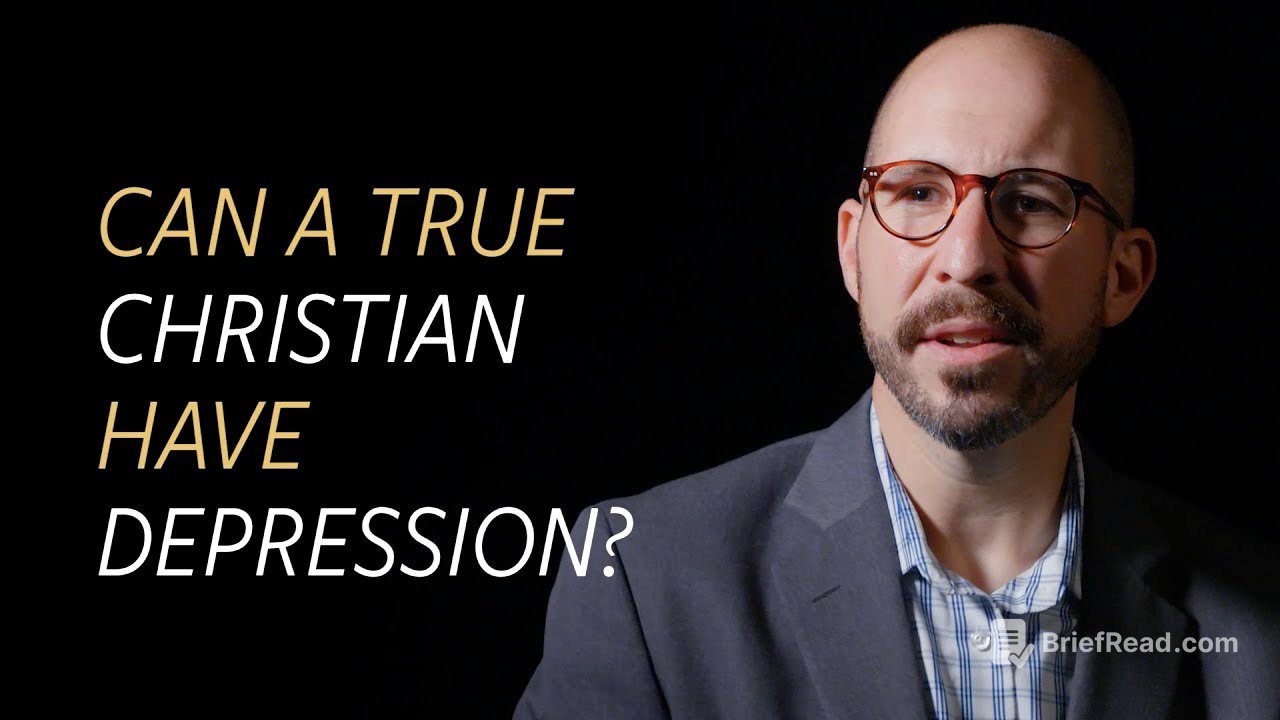TLDR;
The video addresses the question of whether a true Christian can experience depression, arguing that negative emotions, including depression, are not only a part of the Christian experience but can also be necessary. It challenges the notion that happiness is the neutral or expected emotional state for Christians, pointing to biblical examples of sorrow and lament. The video explains that depression can be an accurate emotional response to living in a broken world and that joy, rather than replacing depression, adds to it by recognizing the future hope and restoration promised by God. It also discusses how failed hopes contribute to depression and the importance of focusing on the greater hope in God.
- Negative emotions are a necessary part of the Christian experience.
- Depression can be an accurate response to a broken world.
- Joy adds to depression, offering hope and renewal.
- Failed hopes contribute to depression, highlighting the need for a greater hope in God.
Introduction: Challenging the Pursuit of Happiness [0:07]
The video starts by questioning the common assumption that Christians should always be happy. It challenges the idea that pursuing and attaining happiness is the expected emotional state, suggesting that this expectation is more of a modern, middle-class American ideal than a biblical one. The Bible does not assume that the regular experience of a follower of God is merely positive emotion.
The Necessity of Negative Emotions in the Christian Experience [0:48]
The speaker argues that negative emotions are not only a part of the Christian experience but are also necessary. Emotions, whether positive or negative, reflect our evaluation of the world around us. Negative emotions indicate a negative evaluation, which is appropriate in a broken world. Biblical examples, such as Psalm 13 and Lamentations 3, illustrate that sorrow and lament are common experiences for believers. Jesus's Sermon on the Mount, which states, "Blessed are those who mourn, for they shall be comforted," further supports this idea.
Depression as a Response to a Broken World [3:05]
Depression can be a right evaluation of life because we live in a broken and fallen world. Romans 8 describes the world as "groaning" due to its brokenness, an expression of pain that words cannot capture. Christians, who have the first fruits of the Spirit, also groan, longing for the world to be set free from corruption. Negative emotions like depression can express a heart that accurately sees that the world is not as it should be. Christians should not necessarily feel guilty when they experience depressed feelings, as this can be an accurate emotional response to the depressing reality of a broken world.
The Role of Joy in the Midst of Depression [4:23]
The speaker addresses the common misconception in Christian circles that depression is a purely wrong response, especially when God loves you and you should be joyful. While joy is real, it does not simply replace depressive feelings in the Christian experience. Joy is an addition to depression, a more authoritative recognition that while the world is broken, God will fix it. Joy streaks through depression, renewing it like fresh water diluting a stagnant swamp. This joy acknowledges the brokenness but emphasizes the ultimate truth of God's promise to restore all things.
Understanding the Roots of Depression and Finding Hope [6:14]
Depression often involves placing hope in something that ultimately fails. In a broken world, people are tempted to believe that changing or improving certain situations will bring lasting happiness or solve their problems. When these hopes fail, or when they do not deliver as expected, it leads to depression. It is helpful to identify what one was hoping in that has failed and then challenge oneself to consider the greater hope that God offers. Despite the failures of this broken world, there is a permanent world coming that will not fail. Faith in this promise carries believers through depressive feelings, preventing them from hardening and dominating their entire experience.
The Physiological Aspects and Conclusion [8:12]
Depression is a process that does not disappear overnight and may sometimes stalk a person's life. Physiological elements can contribute to the experience of depression, and medical attention should be sought when necessary. The speaker concludes by affirming that a true Christian can be depressed because depression is not necessarily a sign of seeing things wrongly. Instead, it can be a platform for expressing faith, driving believers to see, value, and long for the world to come in ways they might not have otherwise. The promise that "the Lord is my light" is most precious from a place of darkness.









